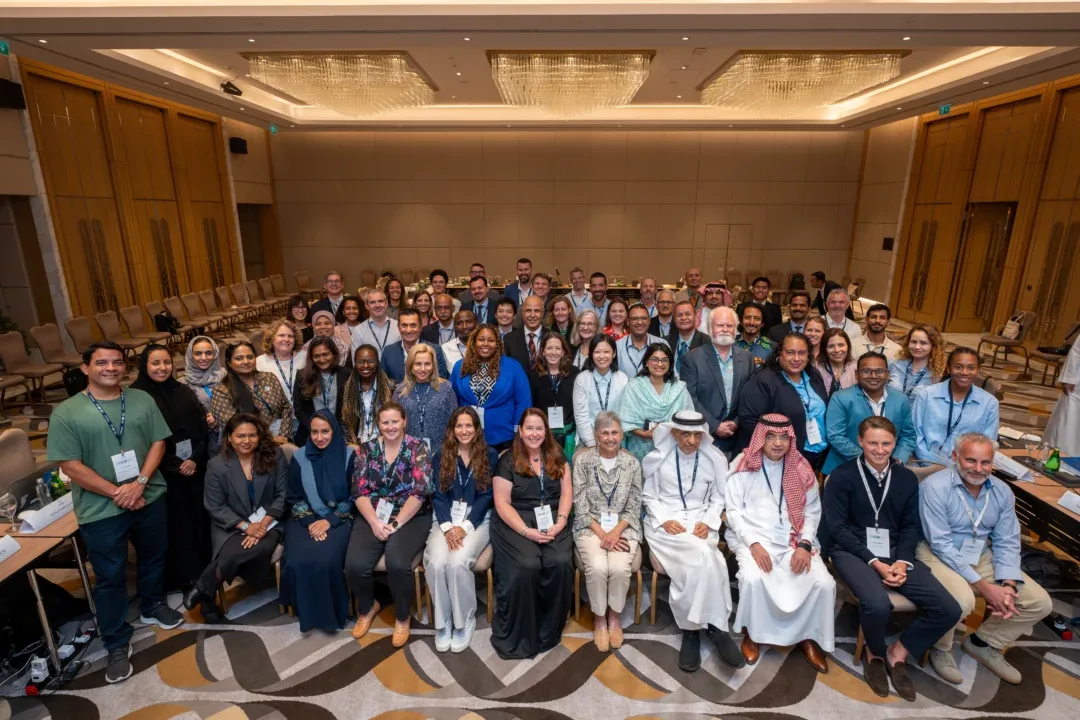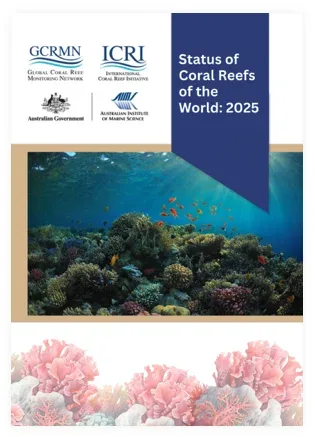
The 38th General Meeting (GM), under the chair of the United States of America, took place in Jeddah, Saudi Arabia, from 10th – 13th September 2024, hosted by the General Organization for Conservation of Coral Reefs and Turtles in the Red Sea (SHAMS). It marked the first ICRI GM to be held in the Middle East region.
Up to 80 participants, from 36 ICRI Members, including 16 member countries attended the GM in-person (who were joined by 10 online participants) bringing together governments, policymakers and leading experts, for rich discussion on the implementation of the “2021 – 2024 Plan of Action: Turning the Tide for Coral Reefs”, the achievements of the Initiative and its membership, and the future direction of ICRI in striving for the conservation, restoration and protection of the world’s coral reefs.
Financial Support from the Government of Sweden played a significant role in ensuring the smooth and successful execution of the event as well as providing support to Official Development Assistance (ODA) countries to attend the meeting.
Read the Summary Record here.
This activity contributes to themes 1, 2, 3, and 4 of the ICRI Plan of Action.

Over the last 10 years, the Global Coral Reef Monitoring Network (GCRMN) has adopted a new approach, based on the analysis of standardised monitoring data. The recent “Status and Trends of Coral Reefs of the World: 2020” GCRMN report has been produced using this approach and has made it possible to estimate temporal changes of hard coral and algae cover at the global and regional scales, between 1978 and 2019.
Given the urgency to conserve coral reefs and the commitments made by countries to 2030, immense value, and need, for the next global report, which will serve to provide an update of the 2020 global report. The GCRMN has therefore launched a call for coral reef monitoring data contributions with the report seeking to describe the global-level temporal trends of hard coral, macro algae, turf algae, and coralline algae.
The call for data is supported by a dedicated webpage (www.gcrmn.net/2025-report), a “Guide for Data Contributors” and a Data Sharing Agreement, with two webinars planned before 2025. Whilst the number of datasets received by the GCRMN has already exceeded the amount received for the 2020 report, there are clear gaps in data. An interactive map of data that have currently been integrated into the global data set for the 2025 global report has also been launched: https://jeremywicquart.users.earthengine.app/view/gcrmndbbenthos with funding contribution provided by the Government of Sweden.
Learn more about the production of the 2025 Global Report here.
This activity contributes to theme 2 of the ICRI Plan of Action.

The Government of Sweden is a co-sponsor of the #ForCoral Pavilion which stands as a critical platform for one of the world’s most threatened, yet valuable, ecosystems at the occasion of the UN Biodiversity Conference CBD COP16. It highlights the urgent need for coral reef conservation, fostering global collaboration and innovation to protect these vital marine ecosystems. As a beacon for collective action, the Pavilion aims to drive solutions that ensure the survival and resilience of coral reefs, emphasising their importance in the broader context of the Kunming-Montreal Global Biodiversity Framework.

Coral reefs are vital ecosystems that support a staggering biodiversity, providing a habitat for countless marine species. However, these delicate ecosystems are under severe threat due to climate change, pollution, and overfishing. Understanding the critical importance of coral reefs to both marine biodiversity and human well-being, ICRI launched the #ForCoral Webinar series as a proactive measure to raise awareness, share knowledge, and foster collaboration among stakeholders worldwide. By bringing together experts, scientists, policymakers, conservationists, and the public, these webinars serve as a platform for dialogue, exchange of ideas, and dissemination of best practices in coral reef conservation and management.
Moreover, the webinars prioritise inclusivity and diversity, ensuring that voices from various sectors, disciplines, and geographical regions are heard. By fostering cross-sectoral collaboration and knowledge exchange, the ICRI #ForCoral Webinar series aims to empower individuals and organisations with the tools, resources, and networks needed to take meaningful action for coral reef conservation. As a result, the financial support from the Government of Sweden, it allowed ICRI to host the webinars with both Spanish and French Interpretation. This was indispensable in effectively disseminating crucial information and fostering a greater global awareness of the issues and solutions coral reefs face.
Webinars held have included:
- Recent Coral Response Events and the Need for Integrated Response Planning
- The Impacts of land-based Sources of Pollution on Coral Reefs
- Integrating coral reefs into NBSAPs
- The Status of the Fourth Global Bleaching Event and the role of the global coral reef
- community
Read more about the upcoming webinars here.
This activity contributes to themes 1, 2, 3, 4 of the ICRI Plan of Action.
Founded in 1994 by eight nations: Australia, France, Japan, Jamaica, the Philippines, Sweden, United Kingdom, and the United States of America, ICRI was announced at the inaugural Conference of the Parties (COP) to the Convention on Biological Diversity (CBD), on December 7th, 1994. Over the past three decades, ICRI has been at the forefront of global efforts to protect and conserve coral reefs, the vibrant ecosystems that support marine biodiversity and livelihoods around the world. To celebrate 30 years of ICRI, the Government of Sweden’s financial contribution helped to:
- Develop a dedicated website, which includes a timeline of the major actions of the Initiative (www.icri30.org).
- Develop an ICRI30 Video
- Develop an ICRI30 Logo
Reef Futures is the only global symposium focused solely on the interventions and actions necessary to allow coral reefs to thrive into the next century. Reef Futures is hosted by the Coral Restoration Consortium (CRC) approximately every two years. It is a conference of hope, action, opportunity, and diversity. Whether you are new to the field, or an experienced professional, this is the place to be if you are passionate about the field of coral reef restoration. Coral reef restoration is critical due to the rising threats from climate change, pollution, and habitat destruction. Coral reefs support immense marine biodiversity, providing shelter and food for countless species. They are also essential to coastal economies, supporting fishing and tourism industries. Additionally, healthy reefs act as natural barriers, protecting shorelines from erosion and storms. Restoring coral reefs helps preserve biodiversity, sustain livelihoods, and strengthen coastal resilience, making it a vital response to the ongoing environmental challenges they face.
ICRI’s ad hoc committee on Reef Restoration and Adaptation was established at the 33 rd ICRI General Meeting, December 2018, in response to disturbances affecting coral reefs, in particular, thermal stress-induced global mass coral bleaching events and the current climate forecasts predicting that sea temperatures will exceed the
thermal tolerances of corals. At the 34 th , 35 th and 37 th General meetings (December 2019, February 2021 and September 2023), ICRI members agreed on extending the mandate of the ICRI ad hoc committee on reef restoration. Given the importance of restoration and the ongoing work of the ad hoc committee, Reef Futures offers an invaluable opportunity to engage face-to-face interactions of the AHC members. This will strengthen partnerships and accelerate the development of innovative solutions needed to address these urgent environmental challenges.
The ICRI Secretariat will be represented at the conference, and will deliver a presentation, and poster session, on the Coral Reef Breakthrough and the work of the ICRI AHC on Restoration and Adaptation.
More information: https://www.reeffutures.com/
This activity contributes to theme 1 of the ICRI Plan of Action.
ICRI is steadfast in positioning coral reefs within the international agenda; raising their plights and promoting solutions to secure their future. Throughout 2024, ICRI has hosted numerous side events that convene high-level decision makers, country representatives, coral reef practitioners, solution providers and managers. The central aim of these events was not only to present the current status of coral reefs, but also provide a platform to discuss the necessary actions that are needed including established, and innovative solutions, from direct interventions to sustainable financial mechanisms. Therefore, in addition to COP16 and Reef Futures, the events that the Government of Sweden has supported, to showcase coral reefs included, but are not to limited to:
- The 14th Monaco Ocean Week and 4th Monaco Blue Initiative (March 2024)
- The UN Decade of Ocean Science Conference, Barcelona (April 2024)
- Our Ocean Conference, Greece (April 2024)
- The 4th International Conference on Small Island Developing State (SIDS), Antigua & Barbuda (May 2024)
This activity contributes to theme 1, 2 and 3 of the ICRI Plan of Action.
